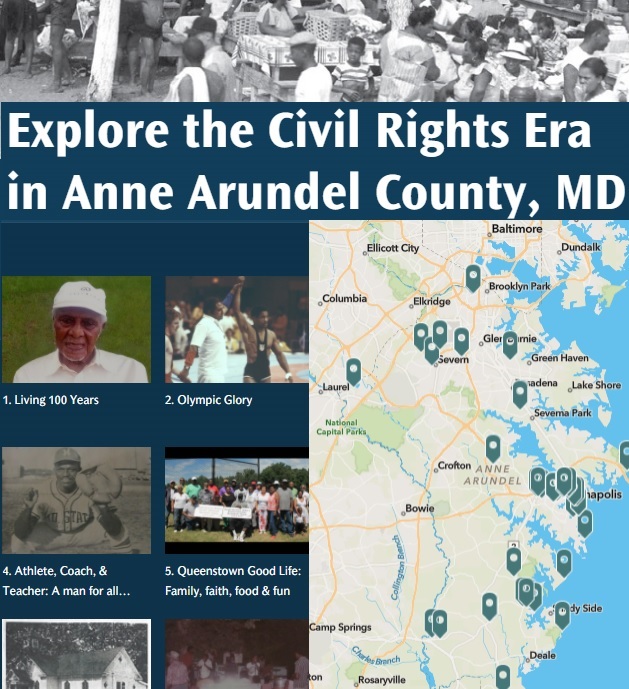Tour Highlights Civil Rights Era

By Susan Nolan
Named for a 17th century princess and known for its Georgian mansions, Anne Arundel County is easily identified as a historic place. Tour guides in colonial costumes routinely lead tourists through the streets of Annapolis and proudly proclaim the Maryland State House to be the oldest in the nation.
But what about more recent history—and history geared towards residents? Anne Arundel County is addressing those issues in its newly launched online Civil Rights Oral History Virtual Tour (aacounty.org/Civil-Rights-Era). Featuring an interactive map and 51 videotaped oral histories, the project focuses on the 20th century African American experience before and during the civil rights era of the 1960s.
The virtual tour is the brainchild and passion project of local genealogist and historian Lyndra Marshall (neé Pratt). Marshall secured funding and coordinated the project by recruiting residents to share their stories. She conducted the interviews, and shares her own extensive knowledge of local history in some of the videos.
A South County native, Marshall says she has always been fascinated by the past and believes future generations will benefit from a better understanding of history. “It’s so important for young people, especially African American children, to understand where they come from, what their parents and grandparents and great-grandparents went through,” she says. “These oral histories connect people to the not-so-distant past and to the places they see every day.”
Wiley H. Bates High School is the focal point of several videos. Prior to desegregation in 1966, it was the only public secondary school for Black students in Anne Arundel County. Annapolis native Mary Snowden Thompson, a 1943 graduate, talks about growing up in Ward 4 in the 1930s and how her education prepared her for life (video 19). Civil rights advocate and community leader Carl Snowden shares the story of how his experiences as a student at Bates during the tumultuous period of integration led him to a life of activism (video 25).
Themes of leisure, work and social justice are also explored in the virtual tour. Discover what world famous entertainers performed at Club Bengazi, an African American-owned nightclub at Carr’s Beach. Learn about the beach resort established by Charles R. Douglass, son of famed abolitionist Frederick Douglass. Hear how the work and words of Martin Luther King Jr. inspired Anne Arundel residents and how the Congress of Racial Equality prepared young people for the abuse they might face as protestors fighting for equality in downtown Annapolis.
Katara West, specialist in the Office of Equity & Accelerated Student Achievement and the Social Studies Office at Anne Arundel County Public Schools, sees the virtual tour as a valuable resource for educators and students at all learning levels. “The Civil Rights Oral History Virtual Tour gives us the opportunity to sit at the feet of our elders and connect with both the trials and the joys of the past,” she says.
West says the school system is committed to developing history curriculum around groups who have been marginalized and to teaching an inclusive local history. AACPS currently offers African American history classes in several high schools, and next year will launch an elective specific to African American history in Anne Arundel County.
“As an educational product, the Civil Rights Oral History Virtual Tour helps us question our assumptions about the past and fills in gaps giving us a more complete narrative,” explains West, “For example, I’m not an Anne Arundel County native. I had no idea African Americans owned so much land until I became involved in this project.”
The Maryland State Archives has established a dedicated Special Collection where the full-length oral history footage and transcriptions are to be housed in perpetuity and can be accessed.
Marshall and West are both optimistic about the expansion of the virtual tour. Marshall believes it could be used as the basis for an African American driving tour that could be used during events, such as family reunions. She is especially interested in collecting more information on Rosenwald Schools. West encourages county residents with stories about the civil rights era to contact her at [email protected].
